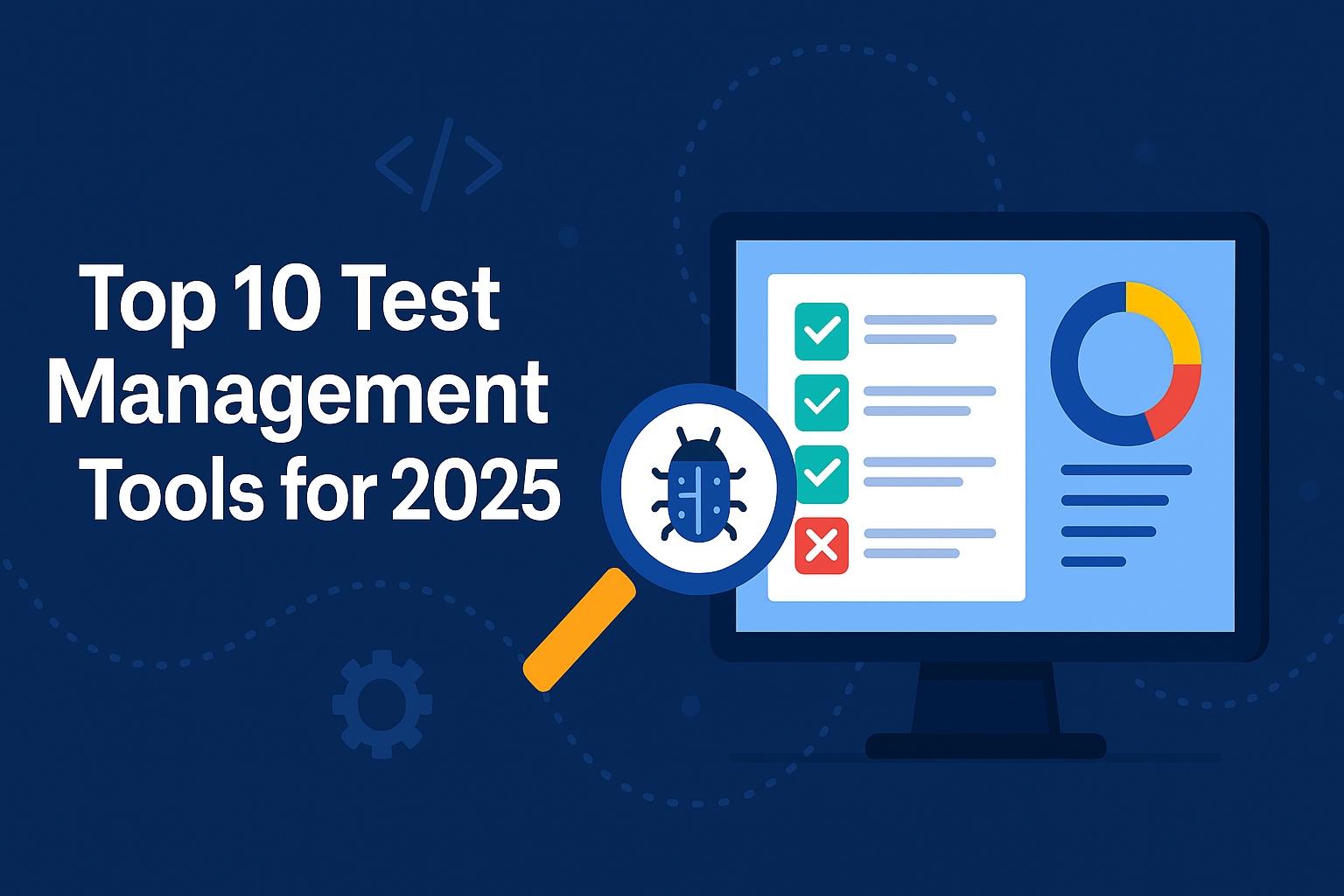Quality Assurance teams in 2026 depend on test management tools to organize test cases, plan testing activities, and ship high-quality software. The best test management software goes well beyond basic case repositories—modern platforms integrate with Jira, GitHub, GitLab, CI/CD pipelines, and automation frameworks so QA fits naturally into agile and DevOps workflows.
Industry reports like the World Quality Report 2025-26 confirm that AI-augmented testing, data-driven quality strategies, and shift-left practices are now mainstream priorities. Choosing the right test case management tool has never been more important for teams that want faster feedback loops and reliable releases. If your team is also evaluating automation platforms, see our roundup of the best AI testing tools.
Below is our curated list of the top 10 test management tools in 2026—plus two honorable mentions—covering features, pricing, integrations, pros, and cons so you can pick the best software test management tool for your team.
1. TestCollab - Modern QA Management with AI and Data-Driven Testing
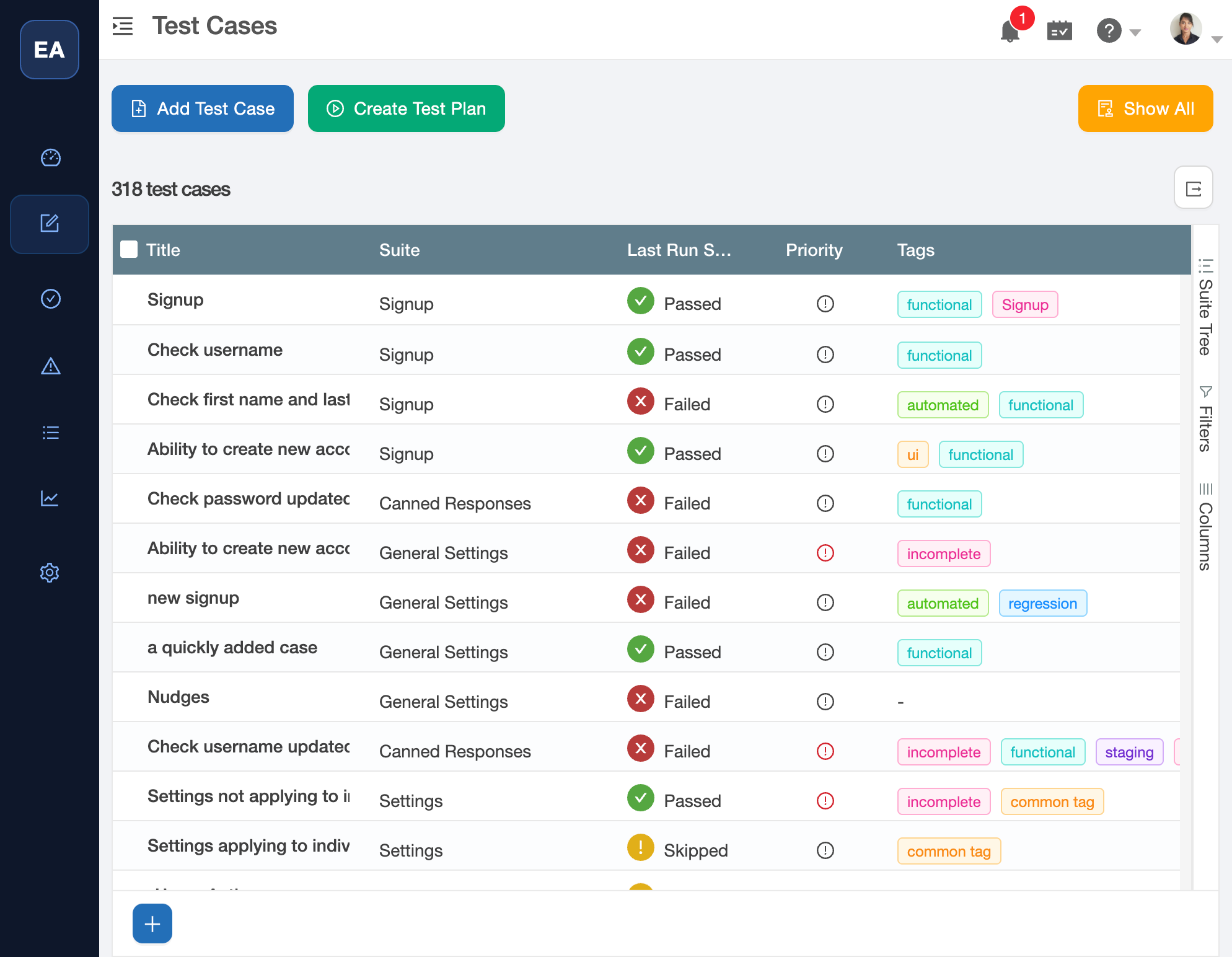
TestCollab is a modern, AI-powered test management tool that delivers an end-to-end platform for test case management, planning, and execution within a clean, cloud-based interface. It has rapidly evolved into one of the best test management tools for teams that value usability without sacrificing depth.
The platform's AI Copilot can generate test cases from requirements, suggest edge-case scenarios, and help teams ramp up coverage faster. Its Test Datasets & Parameters feature enables data-driven testing—run a single test case against multiple datasets (e.g., different usernames or environments) without duplication, reducing maintenance overhead.
Key Features
- Custom test execution statuses and custom fields to tailor workflows
- Full version control of test cases with diff tracking
- Test case review and approval workflows
- Reusable test steps and synced test suites across projects
- Out-of-the-box integrations: Jira (bi-directional sync), Azure DevOps, GitHub, GitLab, Selenium, Playwright, and more
- End-to-end traceability: Jira user story mapping and requirements traceability matrix
- Built-in defect and requirements modules
- REST API for CI/CD and SDK
- Enterprise-grade security: role-based access control, audit logs, SSO
- External defect syncing with Jira, GitHub, GitLab, Azure DevOps, and more
Latest Updates (2025-2026)
- AI Copilot for test case generation and intelligent suggestions
- Datasets and Parameters for data-driven testing
- Custom execution statuses beyond Pass or Fail
- External defect syncing across bug trackers
- MCP Server integration for AI-assisted QA workflows
Integrations & Use Cases
- Easy bug filing from failed test steps via Jira's two-way link
- CI tool integration ideal for DevOps workflows via Jenkins and other CI platforms
- AI-assisted manual and automated testing initiation
- Quick onboarding for teams moving from spreadsheets or legacy tools
Pricing
- Free 14-day trial
- Premium: $29 per user/month
- Elite: $39 per user/month (includes AI Copilot, parameterized testing, custom statuses)
- Enterprise: Custom pricing—SSO, self-hosting
In-Use Example
During execution, testers can mark tests as Passed, Failed, or use custom statuses, add comments, and file bugs directly into Jira. The right-hand panel shows detailed steps and expected results, with progress metrics for clear collaboration between QA and development.
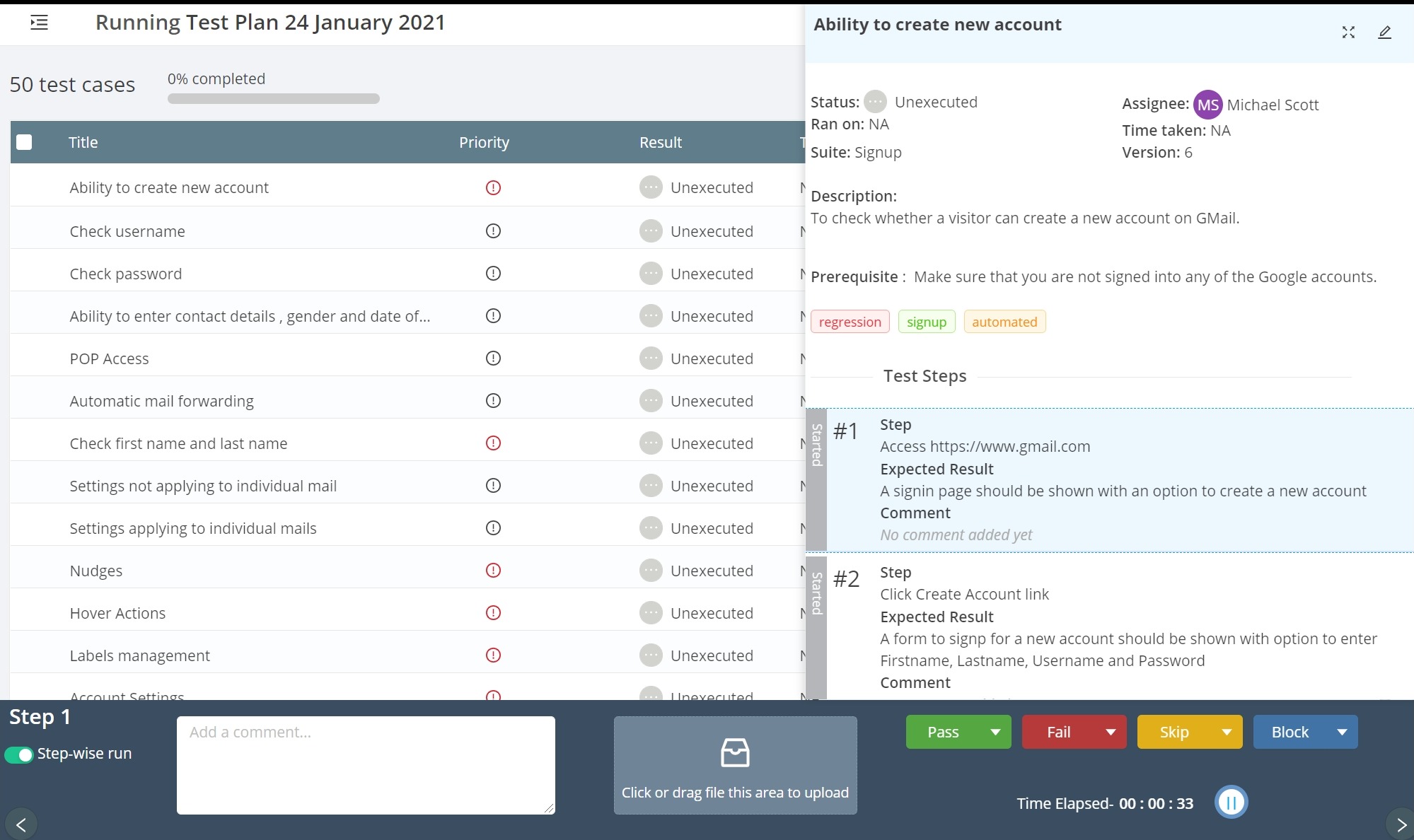
Pros
- Fast onboarding and shallow learning curve
- Clean, modern interface with powerful filters and reusable steps
- Responsive customer support
- Standout features: AI Copilot and data-driven testing
- Affordable compared to legacy enterprise tools
Cons
- Smaller community compared to legacy tools like TestRail
- May require adaptation for highly custom workflows
- No free plan for small teams
2. TestRail - Established Test Case Management Leader
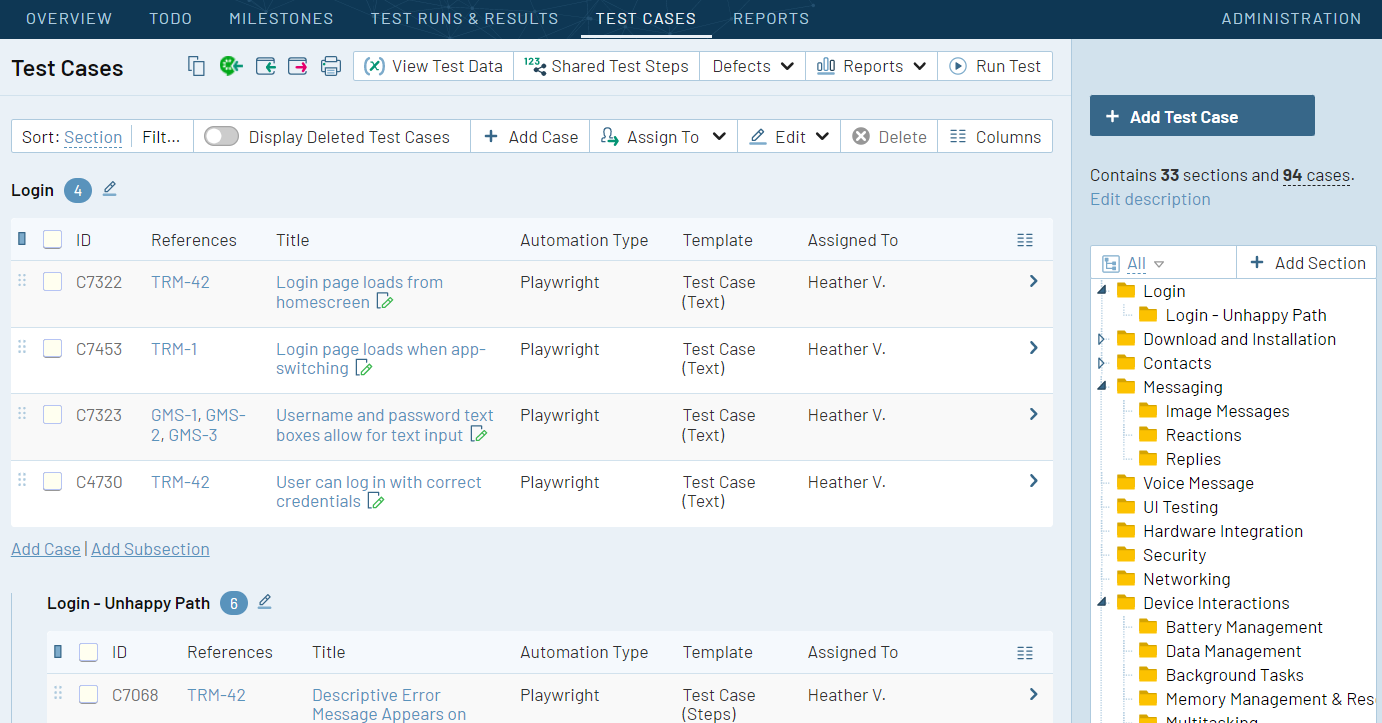
TestRail remains one of the most widely adopted test case management tools for QA teams. As a web-based platform, it offers a comprehensive space to design test cases, organize them into suites, schedule runs, and track results. It supports both manual and automated testing workflows, and integrates with Jira, Azure DevOps, and automation pipelines. In 2025 TestRail added AI-driven features under its new branding as an "AI-Driven Test Management Software."
Key Features
- Hierarchical test suites for structured case organization
- Test case reuse and detailed execution history
- Shareable reports to monitor testing progress
- End-to-end traceability by linking test cases to Jira issues
- CI integration to capture automation results in test runs
- AI features for test case suggestions and analytics
Integrations
- Jira (plugin + REST API) for defect linking and traceability
- Azure DevOps (plugin + REST API) for requirements and bug tracking
- CI tools for automation result push
- Open API for custom connections
Pricing
- Professional Cloud: ~$35/user/month
- Enterprise Cloud: ~$71/user/month
- Self-hosted available
- Free trial; no free tier
Pros
- Well-established with a large user base and short adoption curve
- Flexible for agile or traditional workflows
- Valuable insights from reports for release readiness
- Proven Jira integration and strong automation support
Cons
- Older architecture can slow performance at scale
- UI feels dated, with click-heavy configuration
- Reporting lacks deep customization
- Scaling teams may face high costs
3. Tricentis qTest - Enterprise-Grade & Scalable
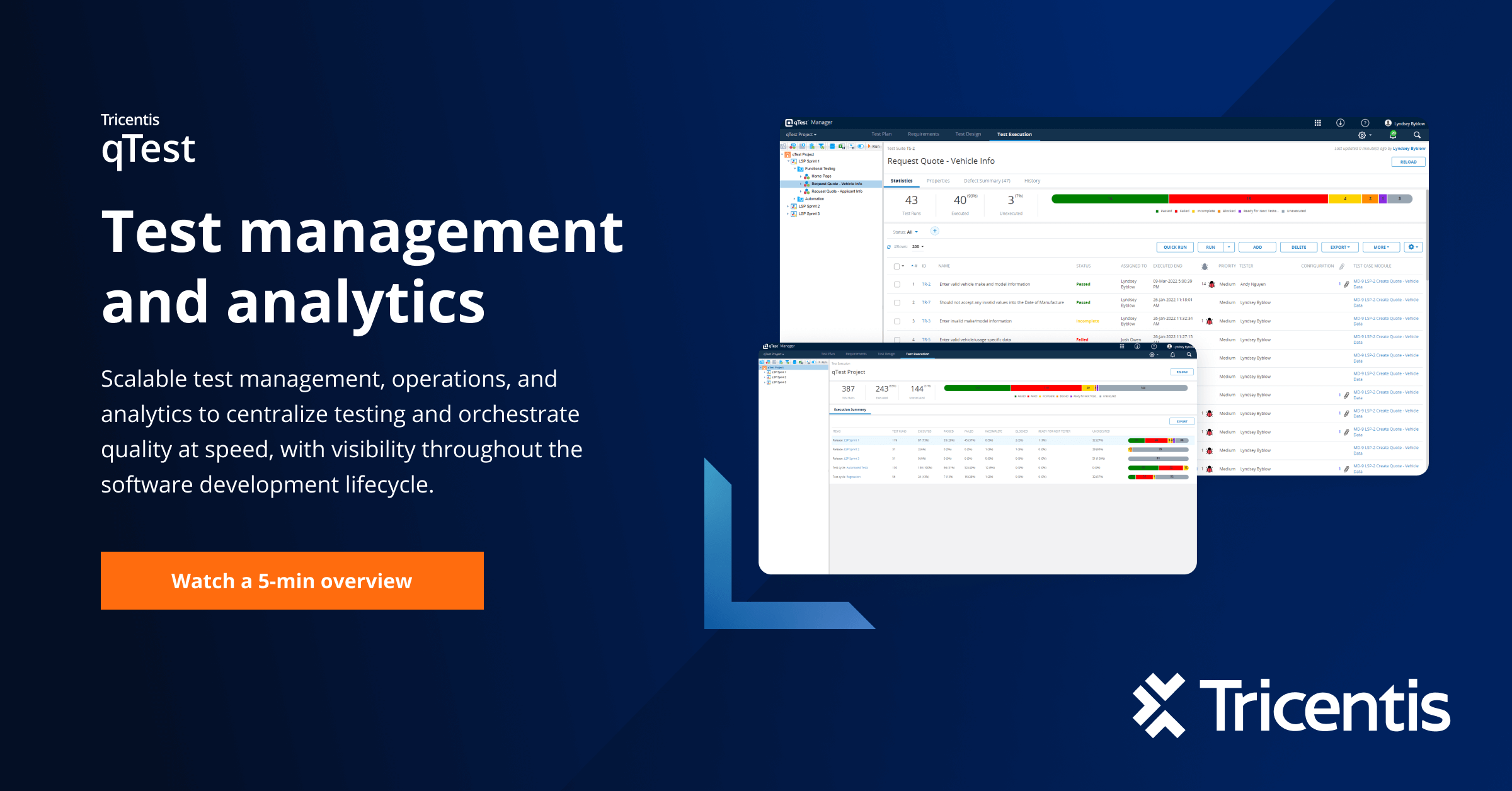
Tricentis qTest is a test management tool built for scalability and integration across the software development lifecycle. It unifies manual, automated, and exploratory testing in a single repository with requirements traceability, cross-project test case reuse, and extensive report libraries.
Key Features
- Modular platform: qTest Manager for test case management, qTest Insights for real-time analytics, qTest Launch for automation scheduling
- Requirements traceability linking requirements to test cases and defects
- Test execution planning for organizing suites and cycles
- Cross-project test case sharing and versioning for reuse across projects and releases
- Over 60 pre-built reports plus custom report configuration for management visibility
Integrations
- Native Jira integration for real-time requirement and defect sync
- Supports Selenium, JUnit, Jenkins, and GitHub for automation and CI
- Centralizes continuous testing in DevOps pipelines
Pricing
- Enterprise pricing via sales; publicly estimated at ~$1,200/user/year (varies)
- Free trial available
Pros
- Scales well for large, complex test portfolios
- Strong analytics and reusable libraries
- Unified visibility across all testing types
Cons
- Expensive and complex for small teams
- Heavy administration needed for simple use cases
4. SmartBear Zephyr - Test Management Inside Jira
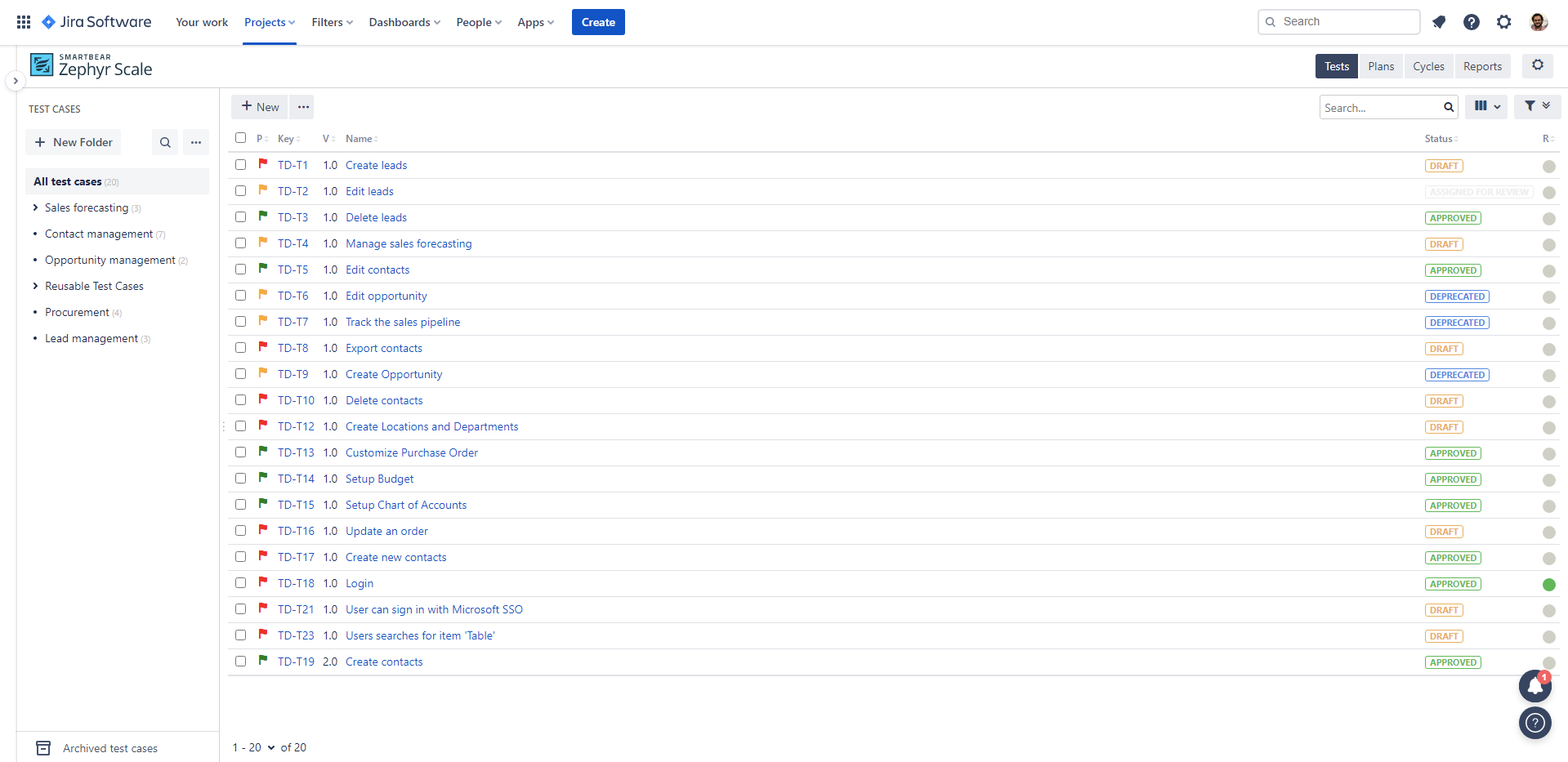
Zephyr is a leading Jira test management add-on offering multiple editions—Squad, Scale, and Enterprise. Squad and Scale facilitate test creation and execution within Jira, with Scale adding features like parameterization and reuse across projects. The Enterprise edition works standalone but still syncs with Jira.
Key Features
- Multiple editions: Squad (create, manage, and execute tests inside Jira), Scale (adds parameterization and cross-project reuse), Enterprise (standalone platform with Jira sync)
- Native Jira integration
- Parameterized testing in Scale edition
- Cross-project reuse capabilities
- Built-in reporting for agile teams
- Upgrade paths for growing teams
Integrations
- Native Jira integration
- Automation via API
- CI/CD pipeline support
Pricing
- Squad: starts at ~$10/user/month (Jira Marketplace)
- Scale: custom pricing
- Enterprise: custom pricing
Pros
- Seamless experience for Jira-based teams
- Rich reporting and scalable editions
- Strong choice for agile test management
Cons
- Best for Jira-only orgs
- High usage affects performance
- Per-Jira-user cost can add up
- Squad may lack capabilities for complex workflows
5. Xray - BDD-Friendly Test Management in Jira
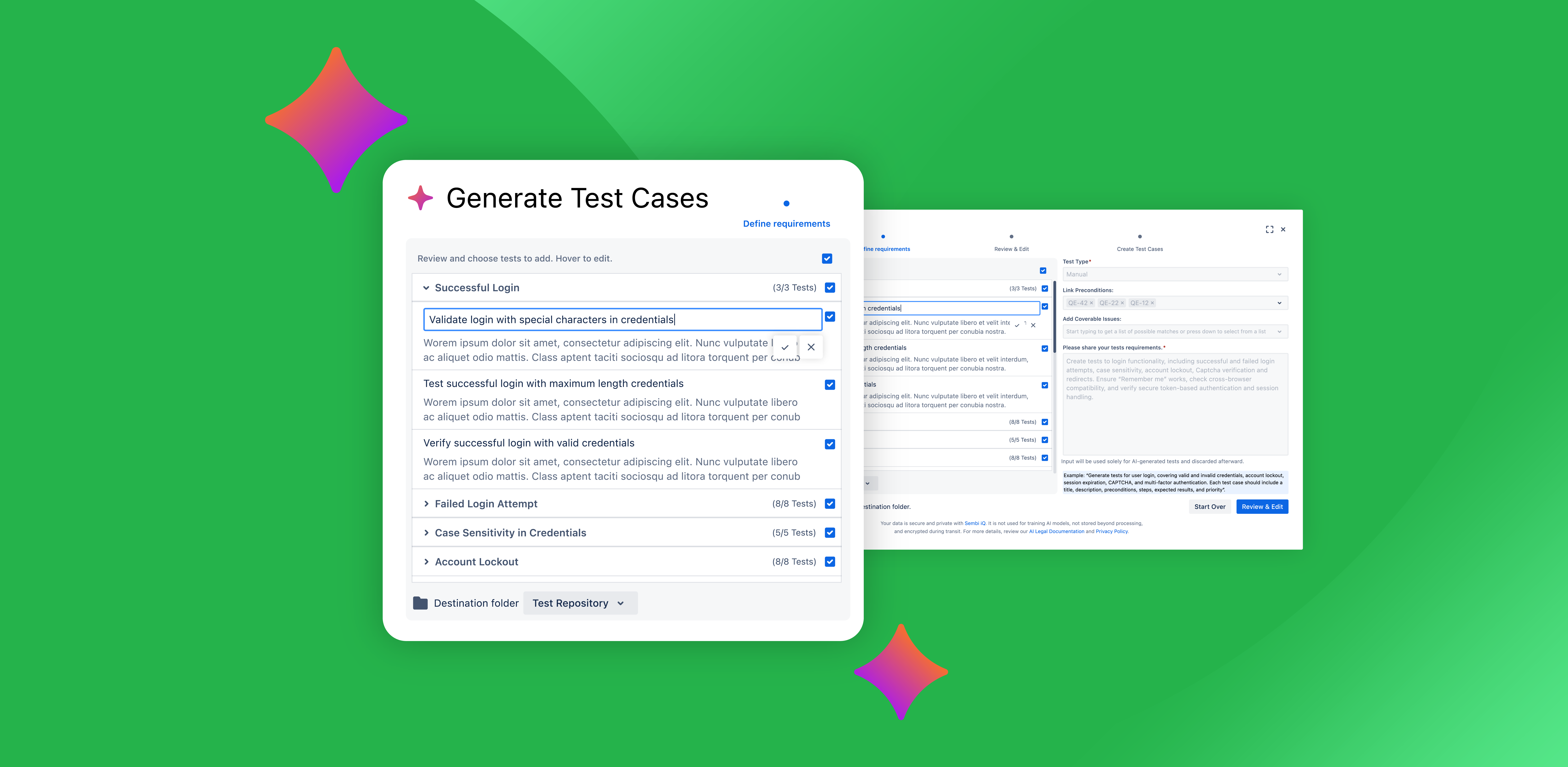
Xray test management tool supports both manual and automated testing, with strong BDD coverage. Teams write Gherkin scripts in Jira, execute them, and link outcomes back to requirements and defects. It is one of the best test management tools for teams practicing behavior-driven development.
Key Features
- Support for manual and automated testing
- Strong native BDD workflows with Gherkin scenario support in Jira
- Full traceability linking requirements, test cases, and defects
- Automation result imports to update execution status
- CI integrations with Jenkins and Bamboo
- Confluence integration for reporting
Integrations
- Works with Cucumber, Selenium, JUnit, NUnit, Robot Framework
- CI tools like Jenkins and Bamboo
- Reporting via Confluence
Pricing
- Cloud: starts at ~$10/user/month (Jira Marketplace)
- Data Center: tiered by users
- Free trial available
Pros
- Great Jira and BDD alignment
- Excellent automation integration and documentation
Cons
- Jira-only focus
- Learning curve for new issue types
- No standalone requirements module
- Test execution within Jira can feel slow
6. PractiTest - End-to-End SaaS Test Management
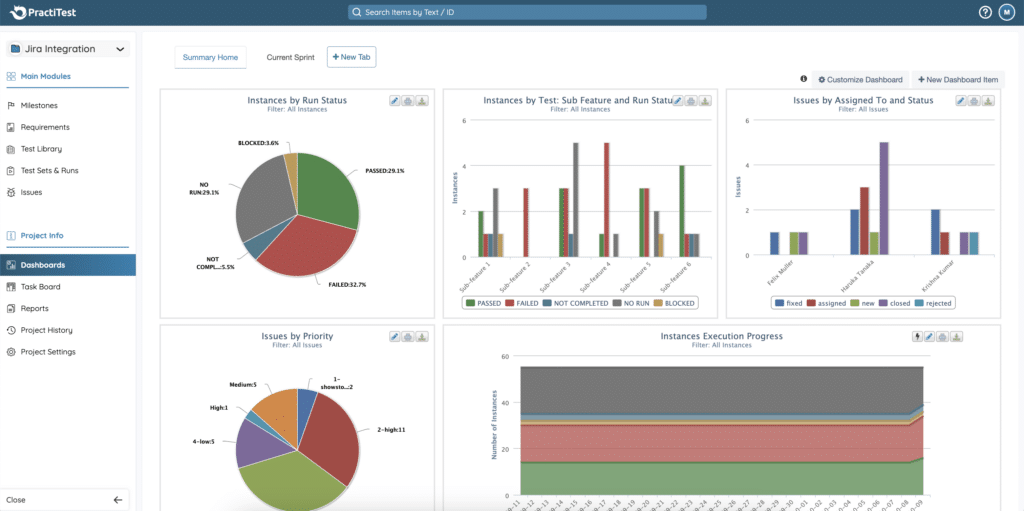
PractiTest is a test management tool that unifies requirements, test cases, and defects into one platform. It offers customizable fields/workflows, step parameters, duplicate bug prevention, and flexible dashboards—making it a solid choice for teams that need deep configurability in their test case management software.
Key Features
- Centralized management of requirements, test cases, and defects
- Flexible custom fields and workflows
- Step parameters and duplicate bug prevention
- Powerful dashboards and reporting
- Reuse of tests and steps for efficient regression cycles
- Highly configurable to match different team processes
Integrations
- Jira and other bug trackers
- CI for continuous testing
- SaaS tools like Monday.com and Salesforce
- Robust API and automation hub
Pricing
- Team plan: ~$49/user/month
- Corporate/Enterprise: custom
- No free tier
Pros
- Highly customizable with strong reporting
- Responsive support and reusable test components
Cons
- UI aging and heavy for new users
- Manual tasks still required
- Can be costly for small teams
7. Qase - Cloud Test Management with Modern UX
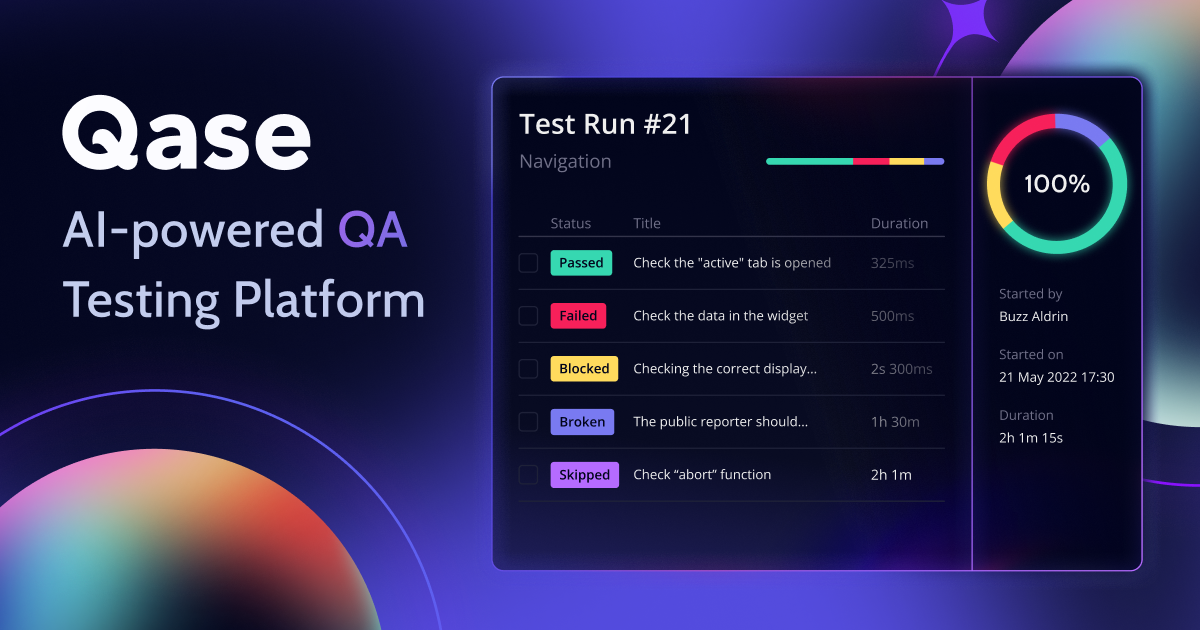
Qase offers a clean, AI-powered interface for tests, plans, runs, and light defect tracking. It integrates with GitHub, GitLab, Trello, Slack, and CI tools with two-way sync. Qase has been gaining traction as one of the best test management tools for modern development teams.
Key Features
- Clean, modern interface for test cases, plans, and runs
- AI-powered test case generation and suggestions
- Lightweight defect tracking and requirements traceability
- Two-way sync with Jira, GitHub, GitLab, Trello
- Notifications via Slack or Microsoft Teams
- Open API for automation result integration
- CI tool support
Integrations
- Major tracker sync, APIs, Slack/Teams notifications
- Open roadmap for feedback
Pricing
- Free tier available (up to 3 users)
- Plus: $24/user/month
- Business: $36/user/month
- Enterprise: custom
Pros
- Fast, user-friendly, great integrations
- Excellent value with a free tier
- Growing AI capabilities
Cons
- Cloud-only, lacks depth of enterprise tools
- Smaller user community
8. Katalon Platform - Integrated Automation & Management
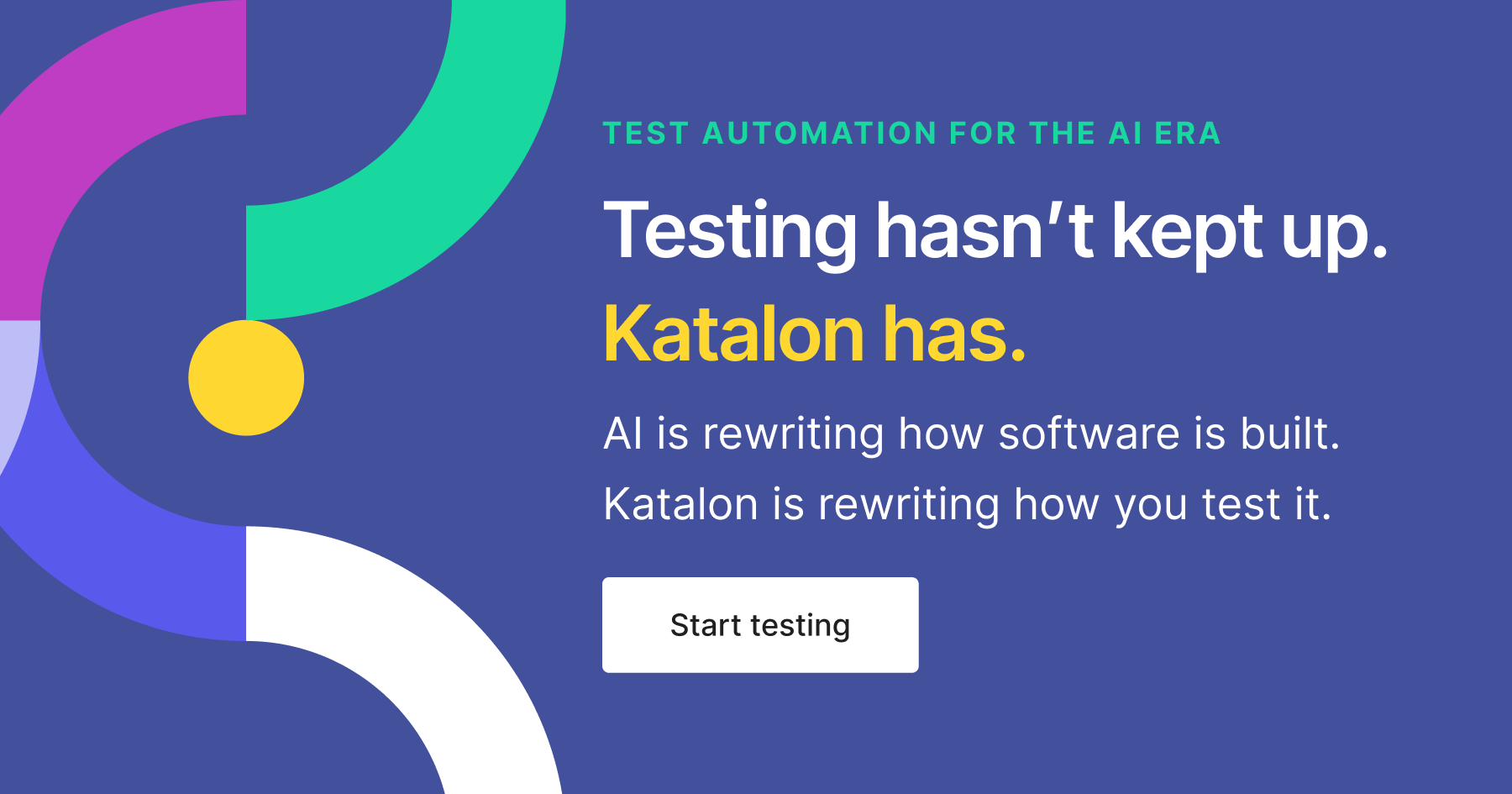
Katalon is a test management tool that blends full automation (web, API, mobile, desktop) with test management, including AI assistance and TestOps for scheduling and analytics. It is a strong option for teams looking for an all-in-one software test management tool that covers both manual and automated testing.
Key Features
- Combined test management and automation stack for web, API, mobile, and desktop
- AI-assisted test creation and self-healing capabilities
- TestOps for centralized scheduling and analytics
- Multi-platform support across devices and environments
- Integrations with Jira, Jenkins, Git, and device farms like Sauce Labs, Kobiton, BrowserStack
Integrations
- Jira / ALMs, Jenkins, Git, device farms (Kobiton, Sauce Labs, BrowserStack)
Pricing
- Platform Premium: ~$175/user/month
- Limited free tier
- Ultimate: custom
Pros
- All-in-one automation and test management
- Multi-platform, growing AI capabilities
Cons
- Heavy tool, slower IDE
- Overkill for manual-only teams
- Expensive
- Integrations still evolving
9. Allure TestOps - DevOps-Ready Testing Platform
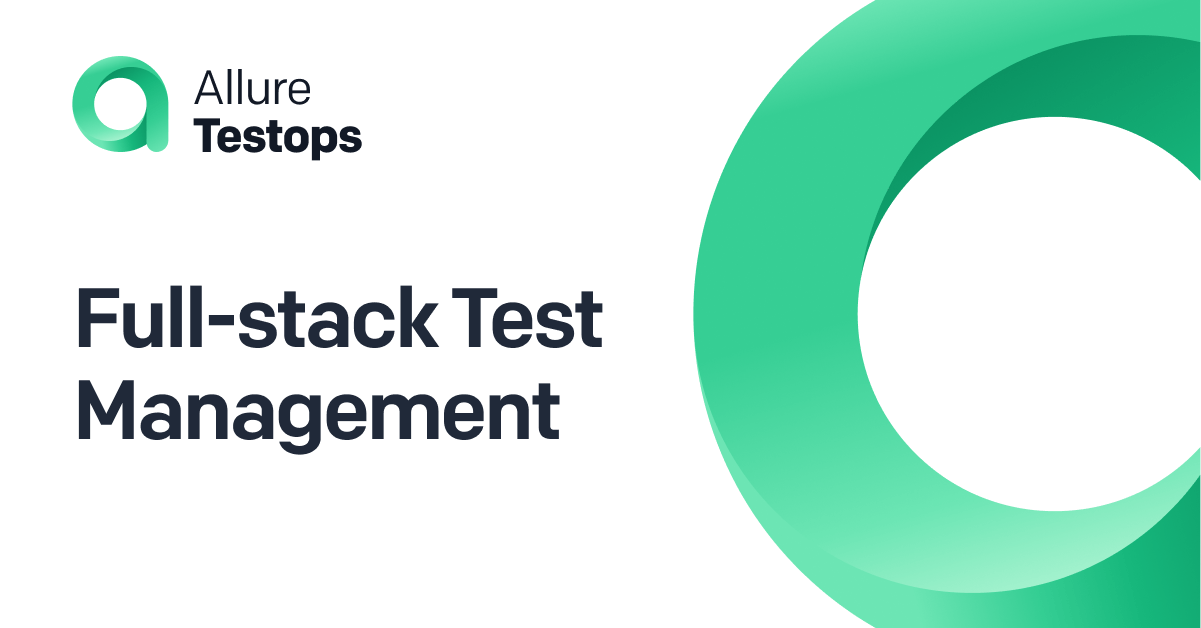
Allure TestOps combines manual and automated testing with strong CI/CD integration and customizable dashboards. It can generate tests from requirements and offers live analytics—a solid fit for DevOps-heavy teams that run high volumes of automated tests.
Key Features
- Unified platform for manual and automated testing
- Strong CI/CD integration with Jenkins, TeamCity, GitLab CI, GitHub Actions
- Live analytics across pipelines
- Test case generation from requirements
- Broad framework support via Allure adaptors
- API for custom connections
- Customizable dashboards for quality tracking
Integrations
- Jenkins, TeamCity, GitLab CI, GitHub Actions
- Jira, YouTrack
- Broad framework support via Allure adaptors
- API for custom needs
Pricing
- ~$39/user/month for mid-size Cloud/Server deployments
- Custom pricing for large teams
Pros
- Excellent CI/CD integration and analytics
- Technology-agnostic with fast UI
Cons
- Manual testing less mature
- Complex configuration and limited documentation
- Best for high automation volume teams
10. Tuskr - Affordable & Aesthetic Test Case Management
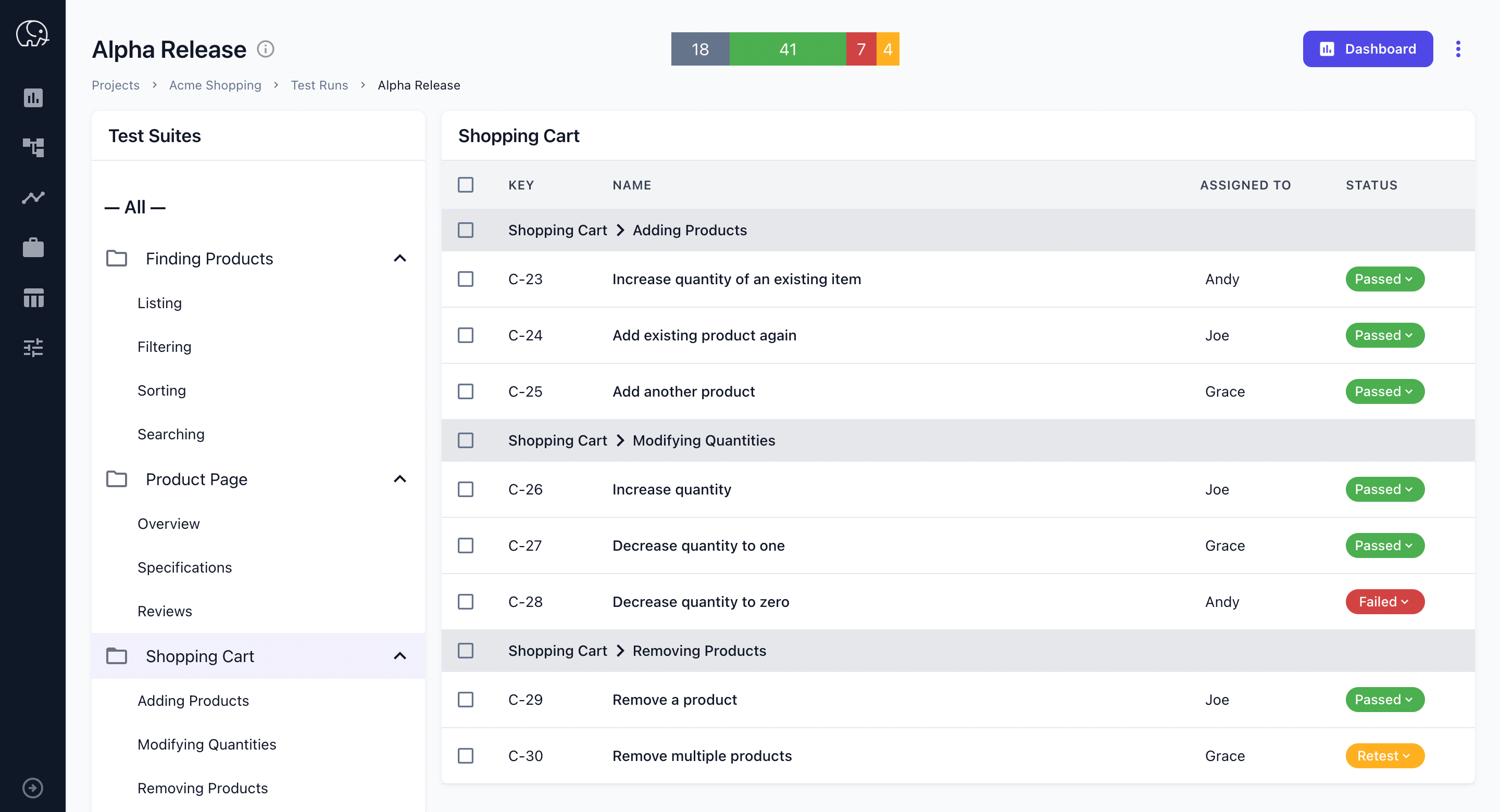
Tuskr offers test authoring, custom statuses, dashboards, and integrations with Jira, Slack, Monday.com, and more. It includes a generous free plan and low-cost tiers, making it one of the best free test management tools for small teams and startups.
Key Features
- Rich test case authoring tools
- Custom test statuses and helpful dashboards
- Generous free plan and affordable paid tiers
- Two-way Jira integration
- Integrations with GitHub Issues, Harvest, Miro, Monday.com, Slack, and Teams
- API support for custom workflows
Integrations
- Jira, GitHub, Harvest, Miro, Monday.com, Slack/Teams
- Some CI support, API access
Pricing
- Free for up to five users
- Paid plans start at $9/user/month
Pros
- Quick to adopt and great value
- Responsive support
- Best free tier among dedicated test management tools
Cons
- Basic reporting and API
- Small community, limited guidance
Honorable Mentions
Beyond the top 10, two platforms are worth watching in 2026:
BrowserStack Test Management
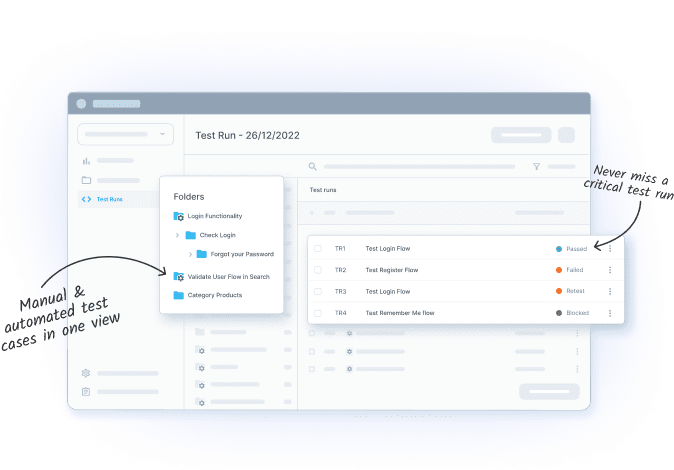
BrowserStack—best known for cross-browser and device testing—has expanded into test management with a unified platform that connects manual test cases, automation results, and real-device testing in one dashboard. If your team already uses BrowserStack for browser testing, adding their test management layer provides seamless context between test design and execution environments. Pricing follows BrowserStack's existing per-user model.
Testsigma
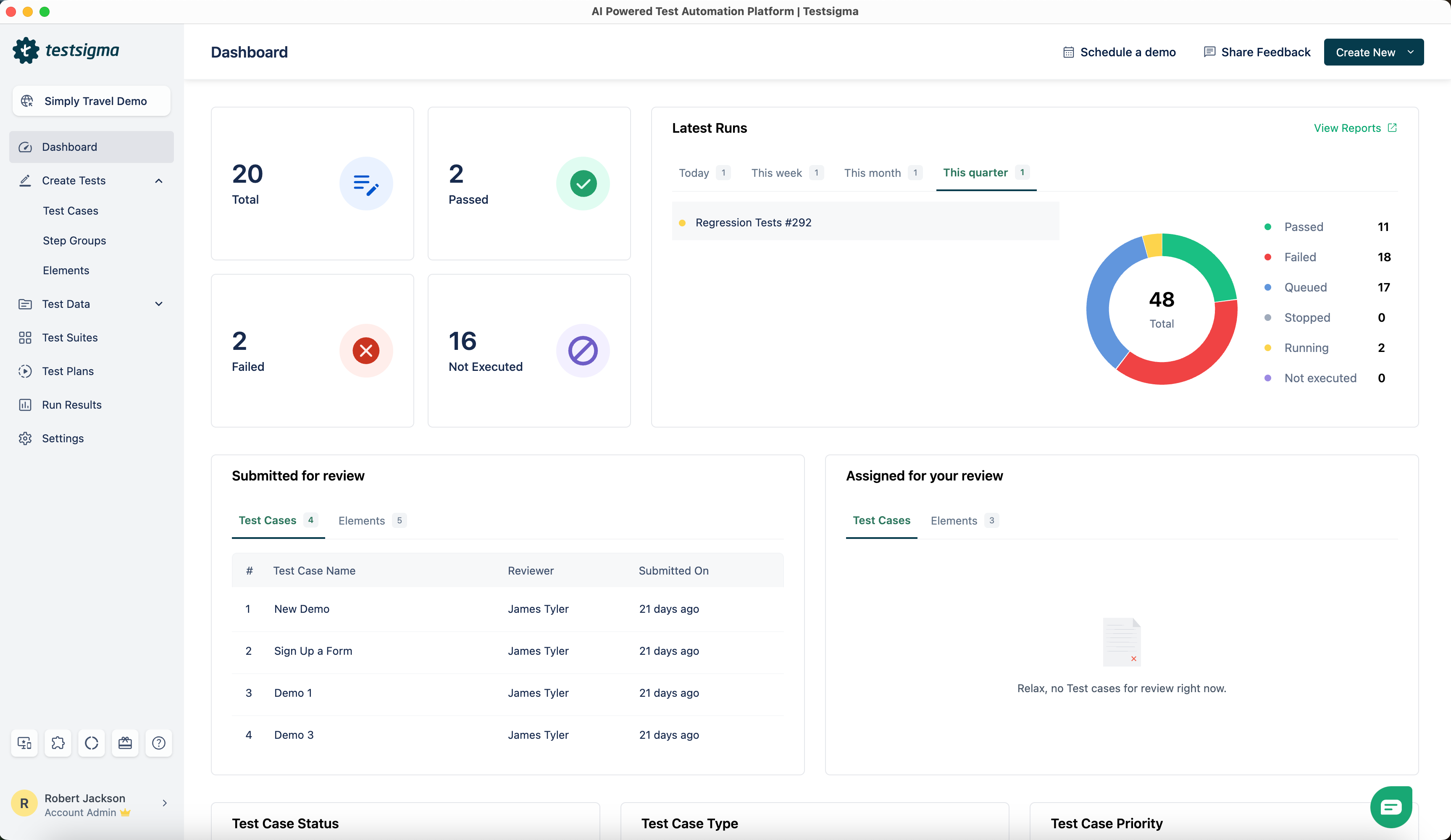
Testsigma positions itself as an AI-agentic test management and automation platform. It combines codeless test creation, NLP-based test steps, and built-in test management in a single cloud-based tool. Testsigma is a strong option for teams that want to unify automation and management without maintaining separate tools, though its test management depth is lighter than dedicated platforms like TestCollab or TestRail.
AI and Automation Trends in Test Management, 2026
AI has become integral to the best test management tools in 2026. The Gartner Magic Quadrant for Application Quality Assurance highlights a continued rise in AI-assisted test case generation, predictive analytics, and intelligent test prioritization. Key trends shaping the landscape:
- AI-powered test generation: Tools like TestCollab's QA Copilot and Qase's AI features can generate test cases from requirements, user stories, or existing documentation—dramatically reducing manual authoring time.
- Shift-left testing: Test management software increasingly integrates earlier in the development lifecycle, with tighter CI/CD pipeline connections and developer-friendly APIs.
- Data-driven testing: Parameterized and dataset-driven approaches (like TestCollab's data-driven testing) allow teams to maximize coverage without duplicating test cases.
- Unified platforms: The boundary between test management, automation, and observability continues to blur—teams want fewer tools that do more.
How to Choose the Best Test Management Software
Choosing the right test case management tool depends on your team size, methodology, and integration needs:
- Integration with development tools: If your team uses Jira, evaluate Jira test management add-ons like Zephyr or Xray, or standalone tools with strong Jira sync like TestCollab. Ensure compatibility with GitHub, GitLab, Selenium, or Playwright for seamless automation capture.
- Balance features with simplicity: Enterprise tools can be powerful but complex. TestCollab strikes a strong balance with its AI Copilot and parameterized testing, yet remains user-friendly enough for fast onboarding.
- Budget & scale: From free test management tools like Tuskr and Qase to enterprise licenses like qTest, calculate total cost per active user and plan ahead for growth. Mid-range tools like TestCollab ($29–39/user/month) offer the best feature-to-cost ratio.
- AI capabilities: In 2026, AI is a differentiator. Look for tools that offer AI-assisted test generation, intelligent prioritization, and smart analytics to accelerate your QA process.
- Open source vs. commercial: If budget is the primary concern, open source test management tools like TestLink exist, but they typically lack the integrations, support, and AI features of commercial platforms.
Test Management Tool Recommendation
TestCollab stands out as the ideal modern solution for test case management in 2026. From scalable pricing and AI-powered workflows to easy migration from legacy tools, it supports both manual and automated testing effectively. With features like parameterized testing, requirements traceability, external defect syncing, and actionable reporting, TestCollab helps teams accelerate releases, improve quality, and adapt quickly as requirements evolve.
We have helped hundreds of teams manage their testing—schedule a call with us or explore all alternatives.
Frequently Asked Questions
What are test management tools?
Test management tools are software platforms that help QA teams organize, plan, execute, and track software testing activities. They centralize test cases, test plans, execution results, and defects in one place—replacing spreadsheets and manual tracking with structured workflows, traceability, and reporting.
What is the best test management tool in 2026?
The best test management tool depends on your team's needs. For a modern, AI-powered platform with strong integrations and fair pricing, TestCollab is an excellent choice. For Jira-native workflows, Zephyr or Xray work well. For enterprise scale, Tricentis qTest leads the market. See our full comparison above for details.
Are there free test management tools?
Yes. Tuskr offers a free plan for up to 5 users, and Qase provides a free tier for up to 3 users. Open source options like TestLink also exist, though they lack the integrations and AI features of commercial test management software. Most paid tools offer free trials—TestCollab's 14-day trial gives full access to all features.
What is the difference between test management tools and test automation tools?
Test management tools focus on organizing and tracking test cases, plans, and results—covering both manual and automated testing workflows. Test automation tools (like Selenium, Playwright, or Katalon) focus on executing tests programmatically. Many modern platforms, including TestCollab, integrate with automation tools to import results and provide unified reporting.
Which test management tools integrate with Jira?
Most modern test management tools offer Jira integration. TestCollab, TestRail, qTest, Zephyr, Xray, PractiTest, Qase, and Allure TestOps all provide Jira connectivity. Zephyr and Xray run natively inside Jira, while others like TestCollab offer bi-directional sync as a standalone platform.

